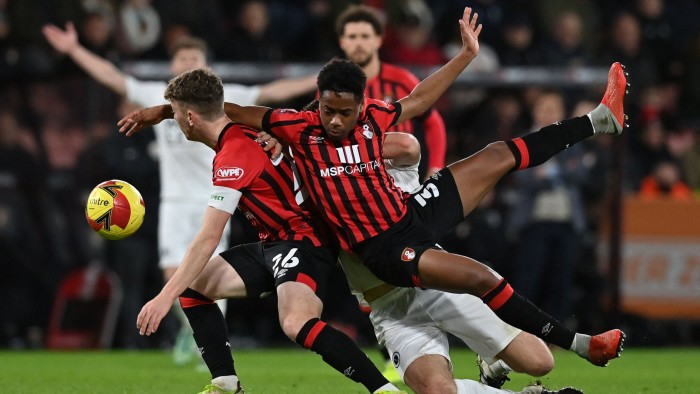US investor Bill Foley leads £120mn deal for Bournemouth football club

Roula Khalaf, Editor of the FT, selects her favourite stories in this weekly newsletter.
A consortium led by American businessman Bill Foley has acquired Bournemouth football club for around £120mn, as US investors accelerate their push into the English Premier League.
Bournemouth said on Tuesday that Russian-born Maxim Demin sold the club to a group led by Foley, who plans to attend the club’s next match against Crystal Palace at the end of the month.
Foley, who owns the Vegas Golden Knights ice hockey team, has teamed up with Hollywood actor Michael B Jordan to buy Bournemouth.
“We will move forward with an ‘always advance, never retreat’ approach that has defined all of my endeavours,” said Foley. “I am committed to work with the best football and business minds available to enhance player development, facilities, and the fan experience to put AFC Bournemouth in the best possible position to succeed.”
The deal also shows how the Premier League clubs are increasingly turning to often deeper pocketed US owners to help compete in the world’s wealthiest football league.
Foley and Jordan are the latest US investors to snap up a Premier League club, following the record £2.5bn acquisition of Chelsea by Todd Boehly and Clearlake Capital this year. John Henry’s Fenway Sports Group and the Glazer family are exploring options, including possible sales, of Liverpool and Manchester United, respectively.
European football clubs are typically more affordable than sports franchises in the US, where leagues are closed and teams cannot be relegated. In England, poor performance results in relegation from the Premier League, leading to a big drop in revenues, with valuations typically reflecting this risk.
Foley and Jordan plan to grow Bournemouth’s commercial and business operations, construct a new training centre for players, and improve or redevelop the south-coast club’s home ground. The Vitality Stadium has space for just 11,300 fans, the smallest in the league and dwarfed by Old Trafford, Manchester United’s stadium, which holds 74,310.
“The people [fans] have no idea what’s about to hit them, it’s fantastic,” said Les Allan, managing director at Santa Monica-based investment bank Montminy, which advised the club. “Bill doesn’t do things by halves.”
His colleague, managing director Javad Ghoreichi, said that Bournemouth needed an owner who could invest in the future and take the club forward. “Bill has the financial capability and resources to do that,” he said.
Foley’s Cannae Holdings said it invested roughly $126mn for control — 50.1 per cent — of Black Knight Football and Entertainment, the entity that acquired Bournemouth.
Demin, who made his money trading petrochemicals, had held shares in Bournemouth since 2011 and took full control two years later. He decided to sell Bournemouth months before Russia’s invasion of Ukraine, according to advisers close to the deal. The Premier League has approved the takeover.
Under Demin’s ownership, Bournemouth rose from the lower divisions of English football to the Premier League. However, the Cherries were relegated in 2020 and made a net loss of £60mn that season, when match day income was wiped out because fans were barred from stadiums due to the pandemic.
The club made a net profit of £17mn in 2020/21 thanks to increased gains from selling players and lower staff costs. Bournemouth returned to the Premier League after winning promotion from the Championship last season. The club is currently 14th in the table, three points clear of the relegation places.
Comments